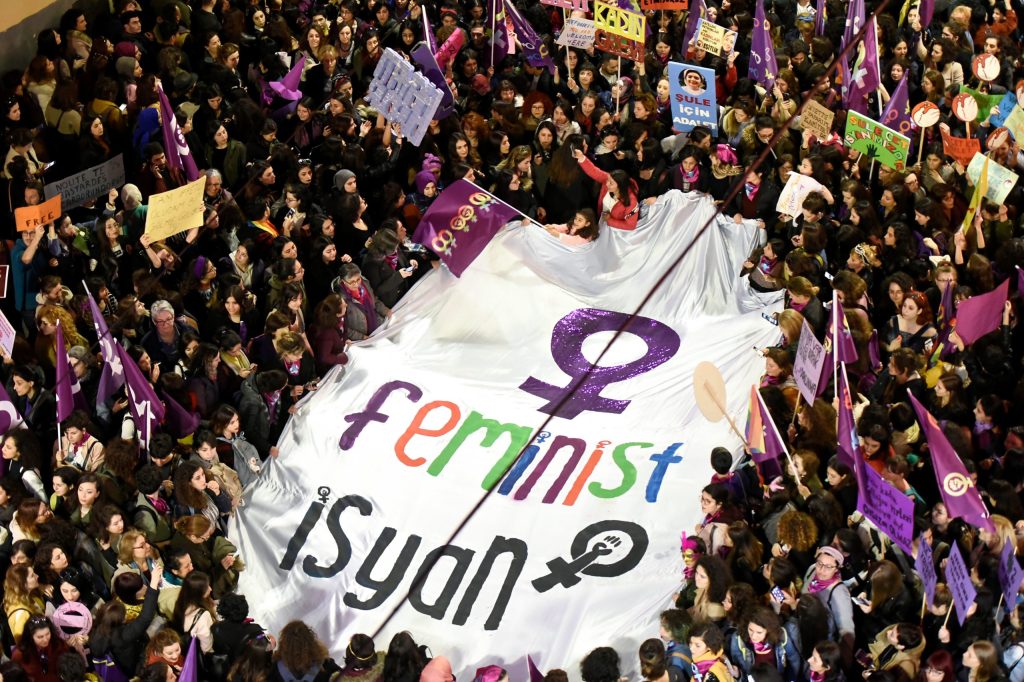In her article at New Lines Mag, Selin Uğurtaş, a freelance journalist based in Istanbul, notes that before Ataturk’s secular state feminism, there were civil Ottoman feminists and they defied “strict exclusion of women from public life,” including harassment of women “walking unchaperoned.”

Selin Uğurtaş / New Lines Mag
Less than a century ago, Mustafa Kemal Atatürk and his single-party regime co-opted a burgeoning women’s rights movement to limit its independent political power and tame its ambitions. His motive, as is so often the case with autocratic rulers, was to turn a potentially formidable challenge to his rule into a revisionist accomplice of it, fostering social cohesion as a bulwark against an external enemy of the state.
Atatürk led the War of Independence and saved the country from foreign occupation following the Ottoman Empire’s defeat in the First World War. After emerging victorious, he carried out numerous, ambitious reforms to create a modern republic from the ashes of the world’s last Islamic caliphate. The republic’s modern women, who were finally free to roam the public sphere, emerged as a symbol of these accomplishments.
Within 15 years, the caliphate was abolished; a unified, secular education was introduced for children, a clothing reform was completed, and a new civil code ended polygamy and gave women equal rights with men on matters relating to divorce. Islam was removed as the state’s official religion, and the principles of secularism were introduced.
In 1930, women were allowed to vote for the first time in local elections. In 1934, universal suffrage was expanded to national elections, earlier than in France, Belgium, and Switzerland.
These improvements were life-changing and were unlikely to happen under different circumstances. Yet they had a single drawback: Women were expected to ascribe to a false narrative on how these rights came about, which completely ignored the vibrant women’s movement that had long been demanding them. Official history claimed that full equality had been achieved under “state feminism,” without any prior demands from women.
Still today, a majority of the Turkish public believes that women were handed their rights, as if on a silver platter. However, according to the rectified version of history, it was in the late 19th century that Muslim women of the Ottoman Empire first started to demand their rights. (Ottoman Armenian women started to voice feminist demands even earlier, but as this piece is concerned with how Atatürk treated the extension of Ottoman Muslim feminists under the new republic, the focus will solely be on the latter.)
At the time, women were strictly excluded from public life. The simple freedom of wandering the streets alone had only become possible after the turn of the century, when the 1908 Young Turk Revolution kicked off the Second Constitutional Period. And even then, harassment of women in public spaces was common.
A 1908 article from the women’s magazine Demet, for instance, complained of repeated attacks against women walking unchaperoned, including one where men bearing pocketknives tore open a group of women’s çarşafs — the loose outer garments that fully cover their bodies and hair.
The women will “no longer silently accept this treatment,” the magazine protested. Women had experienced life in segregation, and they wanted something more.
Through this period, from 1868 until the republic’s founding in 1923, around 40 women’s magazines were published. Women considered these as a means of demonstrating their intellectual prowess and proving that what had held them back was not some biological “inferiority” — as the conventional wisdom stated — but the lack of access to education.
When Şükufezar hit the stands in 1886 as the first magazine to be prepared by and for women, it said: “We, a group that has long been humiliated by men for being ‘long haired and short brained (a proverb that’s still in use today),’ will try to prove that we are in fact just the opposite.”
Women’s demands and rhetoric were further emboldened with the Second Constitutional Period, when everything started to fall into place: Newfound freedoms of the constitutional revolution, combined with inspirational news from the women’s movement in Europe, as well as their own recent access to the printing press, catalyzed Ottoman Turkish women to develop a voice.
Through these magazines, women objected to prearranged marriages, to their vulnerability of being divorced at their husbands’ whim (men could divorce their wives easily by repeating the phrase boş ol three times), and surely, to polygamy. They wanted equal footing within marriage and modern garments that could ease their entry into public life. They wanted an education and to work outside of the home. These demands would later be fulfilled by the secular republic.
“Yes, we have been oppressed and oppressed, and the primary reason for our oppression is because we are being provided solely by men,” wrote Aziz Haydar Hanım for Kadınlar Dünyası (Women’s World) magazine. “If we were to work and earn our living, we would not be so helpless.”
Initially an amplifier of women’s voices in the public sphere, over time the magazines also enabled them to organize gatherings, such as the 1911 “white conferences.” These were named after their all-white rule: The attendees were expected to arrive wearing white at a venue also decorated in white. The orator at these white conferences, Fatma Nesibe Hanım, whose background remains obscure, delivered fiery speeches that were later transcribed for Kadın (Woman) magazine by the event’s anonymous hostess, known by the initials P.B.
“We are confronted with a power that is rotten and stout, that is selfish and hypocritical,” Nesibe Hanım had declared at the first meeting, which was attended by 250 women. “Everything is in their favor: the laws and customs, pleasures and debauchery, riches, power and grandeur, admiration and dominance.”
“I assure you, ladies,” she said, “we will not go on like this. Pay attention to all corners of the world, for we are at the brink of a revolution.”
You can read the rest of the article here.

